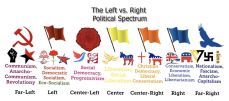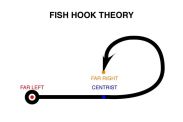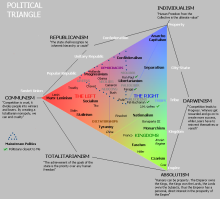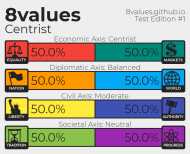The Overton Window
The Overton Window is an artifact of incredible power, that when controlled, makes an ideology's beliefs the status quo and grants them control over the centrists. Throughout history there have been several different controllers of the overton window, starting with Tribalism, then shifting to Monarchism, then Feudalism, then Imperialism, then Liberalism, then finally to Neoliberalism, the current controller.
Featured rulers of the Overton Window:

The Political Compass
A Political Compass refers to any form of diagram which puts Political Ideologies across a set of spectrums. Within the Polcompball canon it is often portrayed as the place on which the characters reside.
History
The conception of categorising political ideologies in a way we commonly understand today (Left-Vs.-Right) started with the French Revolution in which those who supported traditional French society (eg: Supporters of the ![]() Monarchy,
Monarchy, ![]() the first estate and
the first estate and ![]() the second estate) sat on the right and those who supported to abandon these principles in favour of
the second estate) sat on the right and those who supported to abandon these principles in favour of ![]() Republicanism and areligiosity sat on the left (With the left being further divided into the
Republicanism and areligiosity sat on the left (With the left being further divided into the ![]() moderate and
moderate and ![]() radical factions).
radical factions).
After a good while of such a system being adopted a lot of people who dealt with categorising politics found a lot of problems with that systems, thus they started to come up with other systems to better categorize political ideologies.
Placement
A common misconception regarding the standard Political Compass and its ideology placements include fusing the cultural (progressive/conservative) and economic (left/right) axes, with the assumption that culturally progressive ideologies are economically left-wing while culturally conservative ideologies are economically right-wing. Under this model, the economic right supports or enforces a market-based economy, property-owner sovereignty, and seldom engages in economic redistribution. The economic left" supports or enforces wealth redistribution, worker or collective control of the means of production, and the expansion of a welfare system.
For example, an ideology such as ![]() Neoliberalism, which is economically right-wing but culturally progressive, would be placed in the right wing of the compass, which disregards cultural placements due to the unavailability of a third axis on a two-dimensional diagram. Similarly, the culturally conservative but economically left-wing
Neoliberalism, which is economically right-wing but culturally progressive, would be placed in the right wing of the compass, which disregards cultural placements due to the unavailability of a third axis on a two-dimensional diagram. Similarly, the culturally conservative but economically left-wing ![]() National Bolshevism finds itself on the left wing of the compass.
National Bolshevism finds itself on the left wing of the compass.
Models
 The Compass Model
The Compass Model

The Compass Model is the most commonly used within colloquial speech in the Polcompball community. This model is a square with a specifically Left-Right which is strictly economic (![]() Socialism vs.
Socialism vs. ![]() Capitalism) and a Top-Bottom civic axis which puts those who
Capitalism) and a Top-Bottom civic axis which puts those who ![]() support the state at the top and
support the state at the top and ![]() those who oppose it at the bottom. Forming 4 quadrants:
those who oppose it at the bottom. Forming 4 quadrants: ![]() Authleft,
Authleft, ![]() Authright,
Authright, ![]() Libright,
Libright, ![]() Libleft which in some versions is expanded with
Libleft which in some versions is expanded with ![]() Right,
Right, ![]() Left,
Left, ![]() Auth,
Auth, ![]() Lib and
Lib and ![]() Center. The largest flaw with this is the lumping together of Civic values and Cultural values into the vertical axis.
Center. The largest flaw with this is the lumping together of Civic values and Cultural values into the vertical axis.
 The Nolan Model
The Nolan Model

The Nolan Model is a model very similar to the standard model, mostly used within certain ![]() Right-Libertarian circles rephrasing both axes as questions of Economic Freedom Vs. Control and Social Freedom vs. Control. Forming the same axes as the standard model, the chart is also rotated 135 degrees counter-clockwise as compared to the standard model.
Right-Libertarian circles rephrasing both axes as questions of Economic Freedom Vs. Control and Social Freedom vs. Control. Forming the same axes as the standard model, the chart is also rotated 135 degrees counter-clockwise as compared to the standard model.
The chart was created in 1971 by David Nolan who was one of the founders of the U.S. Libertarian Party, this model is used by the World's Smallest Political Quiz.
The Bass Clarinet Model
The Bass Clarinet Model is a political model that expands on the standard model or the Nolan model, it notices that under certain circumstances, in certain respect, only the economic right supports or enforces more than a medium-sized state while only the economic left supports or enforces less or vice versa; thus highlighting a line twisted into a bass clarinet shape.
 The Spectrum Model
The Spectrum Model

The Spectrum Model is the most common political model within contemporary politics with there being just a Left and Right in the same vein as in the French Revolution. It is similar to the Compass Model as it is usually run on Socialism vs. Capitalism. Although the basis for it can be whatever and is not limited to necessarily to the same concepts as the French Revolution or Socialism vs. Capitalism.

 The Horseshoe Model
The Horseshoe Model
The Horseshoe Model is a political model that expands on the line model, it notices that under certain circumstances the far-left and the far-right is in certain respect more similar to each other than they are to the centre, thus twisting the line into a horseshoe shape.

 The Fishhook Model
The Fishhook Model
The Fishhook Model is a response to the horseshoe model from leftists or rightists who view respective points on the model of the far left, centre, and the far right through the lens of class/socio-economic conditions. It states that the centre and the opposite side are both more similar to each other than they are both to their side, twisting the shape of the line into a fish hook shape.
 The Triangle Model
The Triangle Model

The Triangle Model is a model of politics that notices that in politics there are each not dependent ideologically on each other and form more of a triangle with ![]() Socialists on one side,
Socialists on one side, ![]() Conservatives
Conservatives ![]() on the other and
on the other and ![]() Market Liberals on the yet another.
Market Liberals on the yet another.
![]() NRx is fond of this model as it maps neatly into the European conception of the 3 estates, with there being a Traditionalist Right for the first estate (clergy), The Techno-Commercialist Right for the second estate (nobility) and the Nationalist Right for the third estate (the common people).
NRx is fond of this model as it maps neatly into the European conception of the 3 estates, with there being a Traditionalist Right for the first estate (clergy), The Techno-Commercialist Right for the second estate (nobility) and the Nationalist Right for the third estate (the common people).
This model also works vertically, with there being Theocratic-Confessional Authoritarians for the first estate (clergy), Bureaucratic Authoritarians for the second estate (nobility) and Libertarians for the third estate (the common people).
 The Political Cube
The Political Cube

The Political Cube is an expansion on the standard model, it primarily notices that people that while having the same stances on the role of the state and the economy, they can still be significantly divided over the topic of culture and may even decide to side with people from other quadrants because of it. Thus it ads one more axis to that model; The Cultural Axis. Turning the model into a 3D cube.
This third axis can be largely defined by the belief over what should be the role of Heritage within society. With the ![]() Right being Pro-Heritage, believing it to be a necessary and moral part of Human societies and the
Right being Pro-Heritage, believing it to be a necessary and moral part of Human societies and the ![]() Left which is against Heritage, believing it to be a impediment to Societal Progress.
Left which is against Heritage, believing it to be a impediment to Societal Progress.
 Slider-based Models
Slider-based Models

Sometimes even 3 axes aren't enough and because we live in a 3-Dimensional World a "Political Tesseract" wouldn't be exactly easy to read. The solution to this problem that online quiz-makers came up with is to slap a bunch of Line models next to each other and showing where and person/ideology fits within each one. The Slider model is known for being satirized by Jreg in one of his videos in which he stacks One Hundred of them together creating something of a monstrosity. Which is visualized by this graph.
The picture shown on the left is an 8values, the most commonly used of the models. For this one, each result with the values all at 50%, which features 4 sliders, with 8 political values for two of these values for each of those 4 sliders. These sliders are the economic (Equality vs Markets), diplomatic (Nation vs World), civil (Liberty vs Authority) and societal (Tradition vs Progress) axes. For more on 8values, explaining what each value means and other slider models, see Values.
 The Radar Model
The Radar Model

A Radar Model is a less space-intensive alternative to a slider model, which puts the axes next to each to form a Polygonal shape and then forms a blob to symbolize where a person falls on each one of the axes.
This model is used by the "political simulator" Filteries.